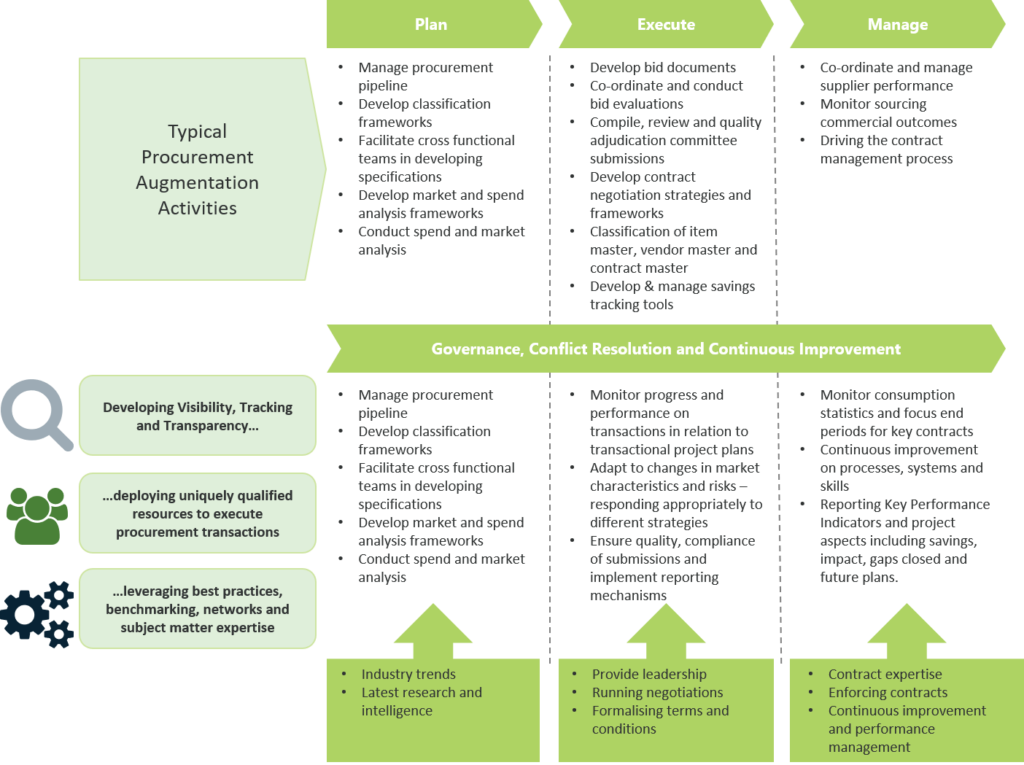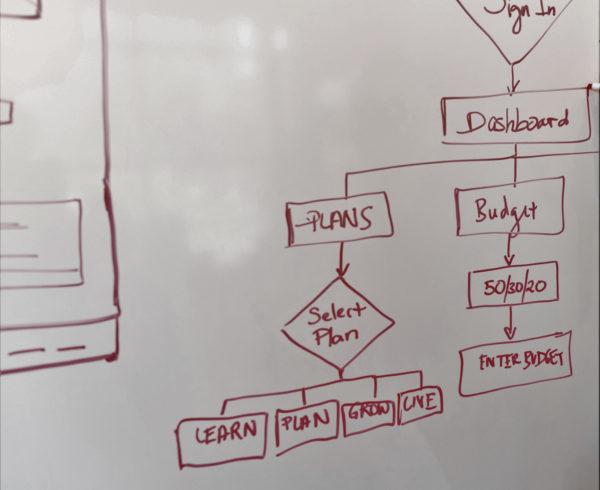Our approach to delivering on SCM augmentation projects
What challenges does procurement face in the South African public sector?
The South African public sector faces many challenges in leadership, operations and executing its mandate to serve the country’s citizens and the interests of the State. Based on our recent work within state institutions – focused on running Supply Chain Management (SCM) and specifically procurement augmentation deliverables within the public sector – the current context can be diagnosed by the following root causes:
- Corruption – The abuse of procurement processes has seen billions of Rands steered towards patronage networks, enriching its beneficiaries. State Capture was this process at its highest form. The consequence is the State cannot effectively execute upon its service delivery mandate, with the public suffering as a result. Public and state entities are now dealing with the systemic consequences of entrenched, high level corruption
- Skills – Through the influence of patronage networks, certain employees are hired because of their connections and not their capabilities, undermining organisational capacity and service delivery.
- Limited digitisation – Manual and paper-based procurement processes limit visibility, tracking and performance
- Political influence – Transversal contracts, which require cooperation across several government departments, become mired in political conflict between public sector stakeholders, ranging from public sector executives to senior government officials. As a result, delivery is undermined as projects are stalled due to this conflict
- Mindsets, behaviour and cultural effects – The culture of non-accountability and irresponsible work ethic has become entrenched within the public sector due to a general lack of performance management. With no oversight, performance is neglected in favour of self-dealing, compromising the ability of state functions to deliver on their mandate
- Legislation – Theoretically well-intentioned, in practice B-BBEE enabling legislation and its associated scorecard is misunderstood. Its heavy public sector emphasis has led to sub-optimal appointments, where capable workers and employees are dogmatically excluded in favour of fulfilling employment equity requirements. This leads to square pegs being placed in round holes across all levels of the public service, negatively affecting service delivery and resource usage. In addition to B-BBEE, the PPPFA has delivered limited impact to the growth of Small and Medium Enterprises
What is the impact of these challenges on public service?
The effect of these challenges and other negative influences is a broken public sector procurement machine that was easily manipulated during the era of State Capture. While its worst excesses have passed, the public sector remains weak, with this weakness underpinned by corruption. Repairing the damage and rebuilding the public sector will take many years, while the impact noted below is attended to:
- Slow throughput on transactions – Middle management have limited visibility on the workloads of their subordinates. The management agenda is purely reactive and customer complaint driven, versus proactively engaging buying personnel to track and trace every procurement event. When customers stop requesting feedback for some or other reason, their transactions are simply lost in the system or get cancelled. This introduces unnecessary rework in the system
- Inefficient turnaround times – Due to limited workload and specialist transaction visibility, buying staff take as much time as possible on each event, reducing throughput to a self-adjudicated level. It is not uncommon for some procurement specialists to continue for more than 12 months without completing a single procurement event
- Lack of performance management – There is limited visibility of employees’ tasks being executed, including the speed, quality and costs of transactions
- Budget overruns – Improper business cases, with misinformed specifications, ultimately cost more in reality than what was budgeted. Due to corruption across the value chain, the Total Cost of Ownership balloons disproportionally to the amount of value derived by the product/service provision
- High levels of litigation – There are businesses that prey on the lack of good SCM governance and procedure execution. They take state organisations to task, winning legal cases with heavy costs to government and state institutions which may also delay service provision
- Lack of contract management – Contracts are renewed at the last minute, with some accumulating irregular expenditure before they are renewed or replaced
- Frustrated workforce (including management) – The resources that attempt to deliver on their roles and responsibilities become angry, disillusioned and frustrated at the lack of management and leadership in dealing with delinquent performers
- Unfavourable audit outcomes – Audit outcomes, however severe, are not interrogated and corrected with proper corrective action plans and monitoring. As soon as auditors leave, the status quo remains until the next audit cycle
Ultimately, the combined impact of these challenges is poor service delivery across South Africa, resulting in an unsustainably heavy burden on the fiscus and a general misalignment between the value and spend of tax payer money.
How are we as Letsema contributing to the wave of positive change in this sector?
The changes required in this sector are three-fold.
First, it begins with the hearts and minds of all who work in service of the State. This ranges from procurement buying personnel, management, CPOs, CFOs, Cabinet Ministers, to even the Presidency and suppliers to state institutions. It includes us as Letsema and other companies that provide SCM augmentation and consulting services to public sector organisations.
This change requires modifying the way we view and do business with the State – from observing state institutions as separate entities to rather seeing them as a part of “us”, because ultimately, the monies spent in these organisations are funded by both ourselves as an organisation and the salaries of those we employ.
Secondly, Letsema’s Supply Chain practice is able to draw on its technical understanding and expertise in SCM and procurement derived from over two decades of consulting experience. We are able to deploy exceptionally qualified teams to execute while leveraging our best practices.
Finally, employees must be hired for their skills and capabilities, not for their loyalty or to fulfil a quid pro quo. The hiring of experienced, skilled practitioners – which is not mutually exclusive from the aims of B-BBEE legislation – will ensure improved public sector performance and optimal use of finite financial and human resources.
Our strong technical understanding of the challenges that need solving, which solutions and skills are required to enable environments to reach their optimal working potential, and a client-centric, people orientated approach mean Letsema is full equipped to tackle any challenge presented to it.
Letsema is a people-centred organisation, caring deeply for our clients and those who enable positive change in the lives and operations of our stakeholders. Our view is the success of public sector organisations will drive the speed and trajectory of government’s service delivery objectives and causes. Our people work with the management of these organisations, together, with the understanding that client success equals the future success of South Africa.
Our approach to SCM and Procurement Augmentation
Within the Supply Chain practice at Letsema, we have developed a deep understanding and relevant experience in procurement and supporting strategic sourcing initiatives within both the public and private sector. Below is a visual illustration of Letsema’s approach to meeting the current challenges, as noted above, in our client organisations:

We develop visibility, tracking and planning capability, and deploy uniquely qualified teams to execute key, high value transactions while leveraging our best practices, benchmark networks and Subject Matter experts.
In summary, our approach to strategic SCM and Procurement Augmentation helps deliver the following requirements and goals for our clients:
- Visibility and transparency – We provide visibility on the full cohort of procurement transactions to highlight and understand the number of transactions at each procurement stage, per person, and whether transactions entering the procurement pipeline are completed, cancelled or withdrawn, and at what stage
- Leadership – We provide a balanced view and ensure stakeholders’ approach to delivery and transaction delivery is from an analytical and strategic, rather than emotive, point of view
- Transfer skills and enhance capability – We transfer skills and train key personnel in the running of procurement events, basic terminology, procedures, legislation and work enablement tools
- Support in performance management to drive impactful delivery – We co-manage transactional resources with our client management team to ensure timely delivery of procurement requests to the expected quality and budget
- Ensure governance quality and compliance – We review all transactions in the procurement pipeline to ensure they comply with correct quality standards. Principal client requirements are carried out and executed with finality within all governance requirements, eliminating potential contracting issues and litigation
As Letsema, we drive change through our people, with the tenacity and care of brother and sisterhood. We have been referred to as cousins, brothers and sisters by our clients in public sector engagements by our clients because of our innate understanding of their needs and our professional as well as ethical conduct.
We seek to create positive change for the betterment of the South African society, with service delivery a key plank of this objective.
Although the general public sector picture may appear challenging, there are pockets of excellence and drive for positive change within the public sector and its procurement functions. We work together with these peer agents of positive change to shift the trajectory towards sector renewal, where ethical standards, constructive leadership and concern for impactful delivery are prioritised.
Does your public sector department or organisation require optimisation? Letsema‘s Supply Chain team can help. Contact them at supply.chain@letsema.co.za, connect with our staff on LinkedIn or call 011 233 0000.









